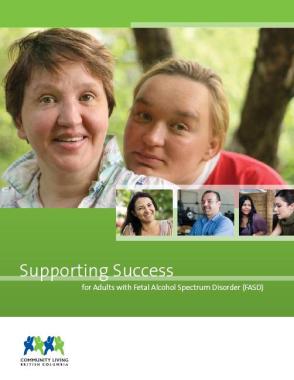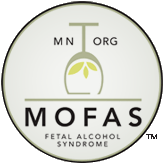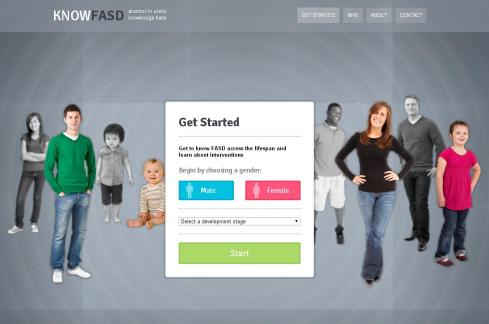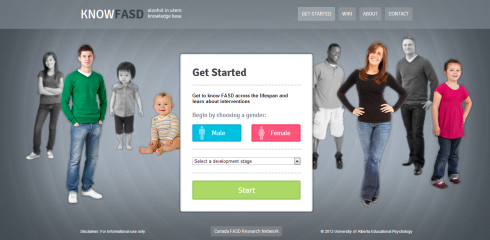You are currently browsing the category archive for the ‘Communication’ category.
Category Archive
KnowFASD is Back! Learn about FASD and Get Help!
May 26, 2015 in Academics, Addictions, Adoption, Adoption/Foster Care, Adult Interventions, Attention/Hyperactivity, Behavioural Interventions, Caregiver Needs, Communication, Criminal Justice, Daily Living Skills, Education, Executive function, Feeding/Eating, Impulsivity/Risk Taking, Language, Math, Memory, Mental Health, Money, Motor/Visual-motor, Resources, secondary disabilites, Self Regulation, Sensory/Motor, Sexuality, Sleep, Social Skills, Tips, Transition Planning, Trauma | Tags: fasd, KnowFASD | 3 comments
After what seems like far too long, KnowFASD is back in operation! To those of you who use the site regularly and have been waiting for its return, thank you for your patience.
If you have never visited the site, please feel free to drop by and check it out! Take a browse through the interactive home page and learn more/find help on the site’s wiki.
Our goal with KnowFASD is to provide a comprehensive site where viewers can learn about the neurobehavioural deficits associated with FASD throughout the lifespan and link to intervention options.
The main homepage of the website is an interactive interface where viewers can scroll through the lifespan of individuals with FASD, with neurobehavioural issues at each developmental stage presented as they may appear in day-to-day life. By clicking on a neurobehavioural issue, viewers are directed to a “wiki” (which works in a similar fashion to Wikipedia) housing information from current research on the neurobehavioural issue at hand. Each wiki page discusses a specific neurobehavioural issue: how it presents, potential causes, and potential consequences. At the bottom of each page, a link is provided to topic-specific intervention options.
Please feel free to visit the site, pass it along, and give us your feedback or suggestions. Check back often as we continue to upload information, links, and resources.
Introducing KnowFASD: The iNAT’s interactive information and intervention website.
April 2, 2013 in Academics, Addictions, Adult Interventions, Attention/Hyperactivity, Behavioural Interventions, Communication, Criminal Justice, Daily Living Skills, Education, Executive function, Feeding/Eating, Language, Living with FASD, Memory, Motor/Visual-motor, Resources, secondary disabilites, Self Regulation, Sensory/Motor, Sleep, Social Skills, Support Groups, Tips | 1 comment
We recently featured our newest project, KnowFASD, in the latest edition of our iNAT newsletter. For those of you who have not yet subscribed to the iNAT newsletter, here is some information about KnowFASD:
Our goal with KnowFASD is to provide a comprehensive site where viewers can learn about the neurobehavioural deficits associated with FASD throughout the lifespan and link to intervention options.
The main homepage of the website is an interactive interface where viewers can scroll through the lifespan of individuals with FASD, with neurobehavioural issues at each developmental stage presented as they may appear in day-to-day life. By clicking on a neurobehavioural issue, viewers are directed to a “wiki” (which works in a similar fashion to Wikipedia) housing information from current research on the neurobehavioural issue at hand. Each wiki page discusses a specific neurobehavioural issue: how it presents, potential causes, and potential consequences. At the bottom of each page, a link is provided to topic-specific intervention options.
Please feel free to visit the site, pass it along, and give us your feedback or suggestions. Check back often as we continue to categorize and upload information.
Supports for Adults with FASD
February 6, 2013 in Adult Interventions, Communication, Daily Living Skills, Living with FASD, Research, Resources, Social Skills | Leave a comment
In my search for intervention information for this blog, I come across many strategies and research studies aimed at children and youth with FASD, which is wonderful. Early intervention and lots of it is a great thing. However, the reality of the situation is that fetal alcohol spectrum disorders do not disappear with time. If you have an FASD as a child, you continue to have it as an adult.
Research by Streissguth et. al.1 shows that adolescents and adults with fetal alcohol spectrum disorders function academically at an early grade school level. Their average adaptive functioning level (i.e. daily living skills, socialization skills, communication skills) is at the level of a typically developing 7 year old. Sixty two percent of adolescents and adults with FASD showed significant maladaptive behaviours, such as poor attention and concentration, teasing/bullying, crying or laughing too easily, dependency, stubbornness, social withdrawal, impulsivity, anxiety, and sullenness).
In another study on young adults with FASD2, the secondary disabilities associated with FASD (such as disrupted school experience, difficulties in the workplace, trouble with the law,and difficulty living independently) are very apparent in adulthood. Approximately half of the participants had needed special education, with only 38% having passed primary school and only 13% having passed high school. Despite a majority of participants having received some sort of job training/preparation, only 13% of participants had ever been employed in a regular job. Only 30% of participants in this study were either living independently or with a partner/family of their own. The remaining 60% were institutionalized or in a dependent-living situation.
Given that we often find that adults with FASD function at the level of school-aged children, ideally they should be provided with the same amount of support we would give to a child. However, this is not always the case. According to the Canadian Child Welfare Research Portal, children with disabilities in Canada receive child welfare protection until the age of 19. In addition to this, many individuals with prenatal alcohol exposure do not receive an FASD diagnosis (but still experience neurobehavioural issues and difficulties with daily living), meaning that without a diagnosis they might be cut off from child protective services at an earlier age (children and youth without disabilities in the child welfare system are eligible for child protective services until age 16-19, depending on the province).
Becoming an adult, leaving the school system, and no longer receiving child welfare services can be a huge loss of consistency and support.
All of this begs the question: What are we doing to support adults with FASD?
In a recent article from the Sudbury Star entitled “We’re just different”, Matthew Pakozdy, a young adult with FASD, speaks about the difficulties and successes of living with FASD.
The take home message from this article? supports are needed for children and adults alike with FASD, and the right supports can make a difference. Pakozdy credits a supportive mother, reliable caregivers/advocates, support staff and friends for the positive changes he has made in his life.
A few other things mentioned in the article as essential supports for individuals with FASD are a permanent cellphone with easily accessible emergency phone numbers, regular income, housing alternatives, and help to foster emotional control and healthy relationships.
With increased awareness and research about FASD, organizations are jumping on board to support adults with FASD:
 Check out Community Living British Columbia‘s “Supporting Success for Adults with FASD”, an online resource for those who work with adults with FASD
Check out Community Living British Columbia‘s “Supporting Success for Adults with FASD”, an online resource for those who work with adults with FASD
 The Minnesota Organization on Fetal Alcohol Syndrome (MOFAS) holds a support group for adults affected by an FASD every Monday until April 2, 2013 in Saint Paul, MN.
The Minnesota Organization on Fetal Alcohol Syndrome (MOFAS) holds a support group for adults affected by an FASD every Monday until April 2, 2013 in Saint Paul, MN.
For other posts about adult interventions, see our archived articles under Adult Interventions.
For our readers: Know of an organization that helps adults with FASD? Share it here or send us an email so we can spread the word!
References:
1. Streissguth, A.P., et al., Fetal Alcohol Syndrome in adolescents and adults. The Journal of the American Medical Association, 1991. 265: p. 1961-1967.
2. Spohr, H.-L., J. Willms, and H. Steinhausen, Fetal Alcohol Spectrum Disorders in young adulthood. The Journal of Pediatrics, 2007. 150(2): p. 175-179.e1.
A Great Online Resource for Kids with Special Needs
June 7, 2012 in Academics, Adult Interventions, Behavioural Interventions, Communication, Daily Living Skills, Resources, Self Regulation, Social Skills, Tips | 2 comments
The Do2Learn website is a fantastic site if you are looking for ways to practice learning at home or if you are looking for resources to pass along to educators, caregivers, service providers, and more!
Although the site is not specific to FASD, the resources target some of the toughest areas for individuals with FASD, such as academics, social skills, behaviour management, communication, and daily living skills. The pages have great ideas for activities in home, community, and classroom settings.
Academics
Difficulties in academic subjects such as reading, spelling, and math are common for individuals with FASD. These difficulties often become worse as the individual gets older, so early intervention is very important. The academics section on the Do2Learn site includes activities to promote the development of many academic skills. Topics include:
- Fine motor skills
- Language
- Visual discrimination
- Literacy
- Math
- Learning Strategies
Social Skills
Many aspects of social functioning are difficult for people with FASD. They may have trouble with getting along with others, making and keeping friends, understanding feelings and emotions, and acting appropriately in social situations. Just like academics, social difficulties can become more of a problem as the individual with FASD enters adolescence and adulthood. The social skills section on the website includes many activities to work on social functioning. Topics include:
- Communication skills
- Social behaviour
- Social skills toolbox
- Emotions colour wheel
- Social emotional skills
Go to the social skills section
Behaviour management
Individuals with FASD often have behaviour difficulties. Some of these behaviour difficulties may show up as defiance, acting out, temper tantrums, aggression, stealing, etc. It is important to remember that these behaviours are usually not intentional. Negative behaviours often occur secondary to other difficulties, such as environmental stresses, lack of understanding, poor cognitive ability, or unreasonable expectations. The Do2Learn website keeps this in mind with suggestions for:
- Classroom strategies to promote good behaviour and accommodate students with special needs
- Resources to help understand and deal with the underlying causes of behaviour
- Behaviour management strategies
Go to the behaviour management section
For Adolescents and Adults:
There is also a great “jobTIPS” resource for older adolescents and adults looking to get involved in the work force. JobTIPS takes the individual through a user-friendly job-planning process with step by step instructions, tips, and resources. Featured topics include:
- Determining Interests: The client discovers what their interests and strengths are and what they need to work on (i.e. social skills)
- Finding a Job: Different ways to look for work
- Getting a Job: How to navigate the application and interview process
- Keeping a Job: Keeping up with workplace expectations and how to behave in a work setting
- Other Job Topics: Such as how to leave employment, legal rights in the workplace, etc.
For our readers:
Is there a resource on the Do2Learn website you have found particularly helpful? Leave a comment and share it here!
What other sites/resources have you found helpful?
References:
Kodituwakku, P. W. (2007) Defining the behavioral phenotype in children with fetal alcohol spectrum disorders: a review. Neuroscience and Biobehavioral Reviews, 31, 192-201.
Kodituwakku, P. W. (2009) Neurocognitive profile in children with fetal alcohol spectrum disorders. Developmental Disabilities, 15, 218-224.
Mattson, S. N., Crocker, N., & Nguyen, T. T. (2011). Fetal alcohol spectrum disorders: neuropsychological and behavioral features. Neuropsychology Review, 21, 81-101.
McGee, C.L., & Riley, E.P. (2007). Social and behavioral functioning in individuals with prenatal alcohol exposure. International Journal on Disability and Human Development, 6(4), 369-382.
Rasmussen, C. & Wyper, K. (2007). Decision making, executive functioning, and risky behaviours in adolescents with prenatal alcohol exposure. International Journal on Disability and Human Development, 6(4), 405-416.



